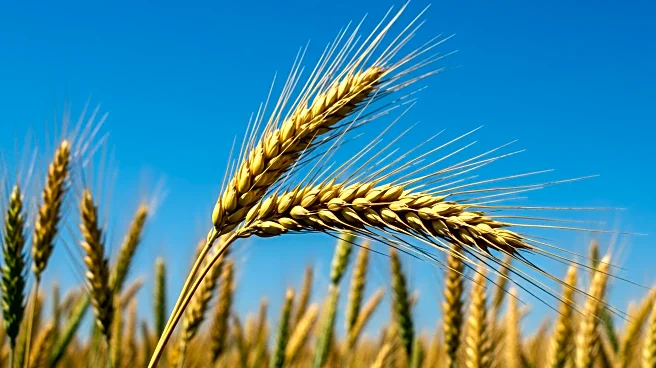What's Happening?
Recent heavy rainfall in Argentina has significantly benefited farmers during the fertilization phase of the wheat crop for the 2025/26 season, according to the Buenos Aires grains exchange. The report highlights that between 50 to 150 millimeters of rain fell across the country's agricultural heartland, enhancing moisture levels crucial for the growing cycle. Argentina, a major global wheat supplier, has approximately 6.7 million hectares of wheat fields this season, with the harvest expected to commence in November. Additionally, corn farmers have completed 95.9% of the 2024/25 harvest, with the next planting season anticipated to cover a near-record area of 7.8 million hectares.
Why It's Important?
The rainfall is pivotal for Argentina's agricultural sector, particularly for wheat production, which is a significant component of the country's export economy. Improved moisture levels can lead to higher yields, potentially boosting Argentina's position in the global wheat market. This development is crucial for economic stakeholders, including farmers and exporters, as it may enhance profitability and market competitiveness. Furthermore, the successful completion of the corn harvest and the upcoming planting season indicate robust agricultural activity, which is vital for sustaining economic growth and employment in rural areas.
What's Next?
As the wheat harvest approaches in November, continued favorable weather conditions could further improve crop yields. Stakeholders, including farmers and agricultural businesses, will be monitoring weather patterns closely to optimize production strategies. The anticipated increase in corn planting area suggests a focus on expanding crop output, which could influence market dynamics and pricing. Additionally, international buyers may adjust their procurement strategies based on Argentina's production forecasts, impacting global supply chains.
Beyond the Headlines
The rainfall's impact on agriculture underscores the importance of climate variability in crop production. As climate change continues to affect weather patterns, farmers may need to adapt their practices to mitigate risks associated with unpredictable conditions. This situation highlights the need for investment in sustainable agricultural technologies and practices to ensure long-term resilience and productivity.











